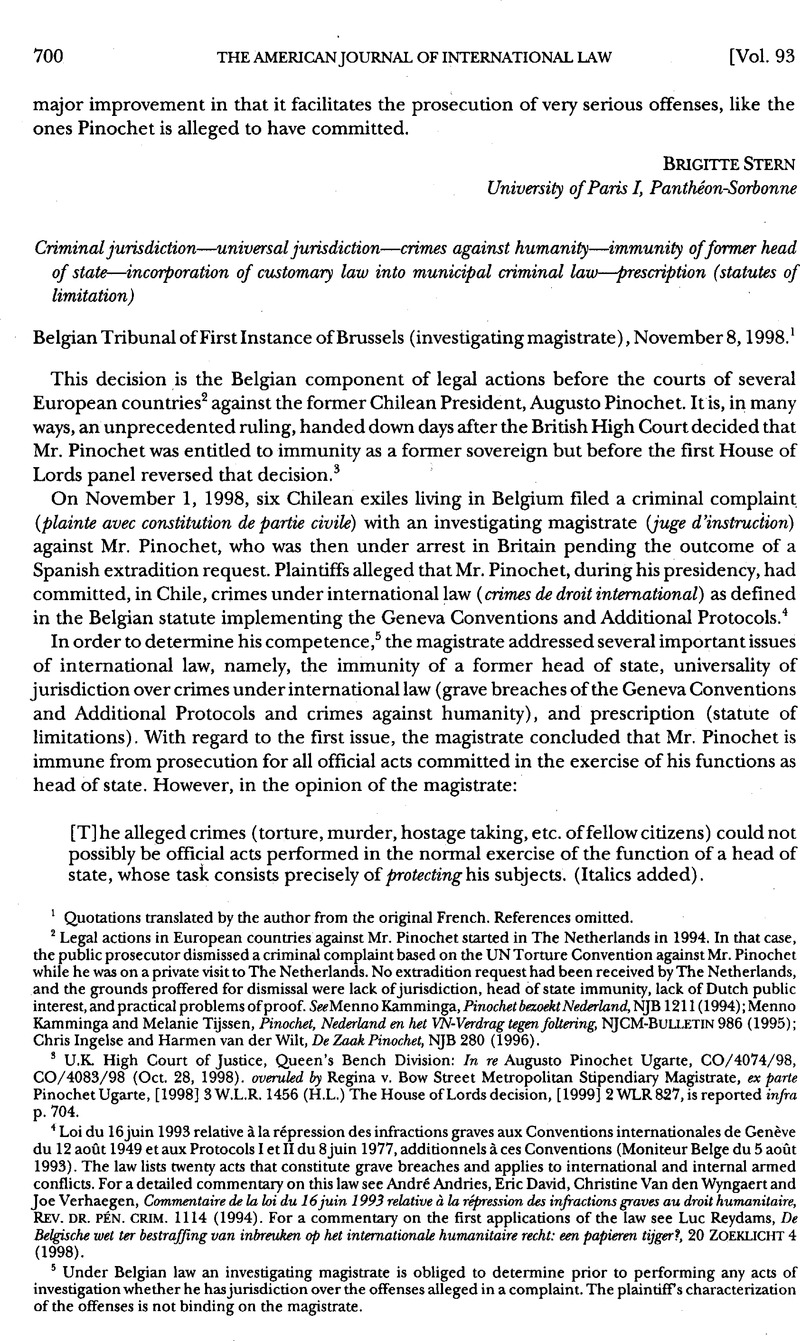Article contents
Belgian Tribunal of First Instance of Brussels (Investigating Magistrate), November 8, 1998
Published online by Cambridge University Press: 27 February 2017
Abstract

- Type
- International Decisions
- Information
- Copyright
- Copyright © American Society of International Law 1999
References
1 Quotations translated by the author from the original French. References omitted.
2 Legal actions in European countries against Mr. Pinochet started in The Netherlands in 1994. In that case, the public prosecutor dismissed a criminal complaint based on the UN Torture Convention against Mr. Pinochet while he was on a private visit to The Netherlands. No extradition request had been received by The Netherlands, and die grounds proffered for dismissal were lack of jurisdiction, head of state immunity, lack of Dutch public interest, and practical problems of proof. See Menno Kamminga, Pinochet bezoekt Nederland, NJB 1211 (1994); Menno Kamminga and Melanie Tijssen, Pinochet, Nederland en het VN-Verdrag tegen faltering, NJCM-Bulletin 986 (1995); Chris Ingelse and Harmen van derWilt, De Zaak Pinochet, NJB 280 (1996).
3 U.K. High Court of Justice, Queen’s Bench Division: In re Augusto Pinochet Ugarte, CO/4074/98, CO/4083/98 (Oct. 28, 1998). overuled by Regina v. Bow Street Metropolitan Stipendiary Magistrate, ex parte Pinochet Ugarte, [1998] 3 W.L.R. 1456 (H.L.) The House of Lords decision, [1999] 2 WLR 827, is reported infra p. 704.
4 Loi du 16 juin 1993 relative à la répression des infractions graves aux Conventions internationales de Genéve du 12 août 1949 et aux Protocols I et II du 8 juin 1977, additionnels à ces Conventions (Moniteur Beige du 5 août 1993). The law lists twenty acts that constitute grave breaches and applies to international and internal armed conflicts. For a detailed commentary on this law see André Andries, Eric David, Christine Van den Wyngaert and Joe Verhaegen, Commentaire de la loi du 16 juin 1993 relative à la répression des infractions graves au droit humanitaire, Rev. Dr. Pén. CRIM. 1114 (1994). For a commentary on the first applications of the law see Luc Reydams, De Belgische wet ter bestraffing van inbreuken op het internationale humanitaire recht: een papieren tijger?, 20 Zoeklicht 4 (1998).
5 Under Belgian law an investigating magistrate is obliged to determine prior to performing any acts of investigation whether he has jurisdiction over the offenses alleged in a complaint. The plaintiff’s characterization of the offenses is not binding on the magistrate.
6 Article 7, paragraph 1 provides: “Les juridictions beiges sont compétentes pour connaître des infractions prévues à la présente loi, indépendamment du lieu où celles-ci auront été commisses.”
7 Subsequently, however, the Belgian Parliament amended the statute implementing the Geneva Conventions and Additional Protocols of June 16, 1993. The new tide is “Loi relative à la répression des violations graves de droit international humanitaire” (Moniteur Belge, Mar. 23, 1999). The amended statute includes crimes against humanity and genocide, and qualifies them as “crimes de droit international.” As in the case of grave breaches of the Geneva Conventions and Additional Protocols, universal jurisdiction applies. Moreover, the travaux préparatoires make clear the drafters’ intent that the statute also applies to crimes committed before its adoption, “because crimes against humanity and genocide were already crimes under customary and conventional international law” and “another interpretation would be contrary to the ratio legis of the present bill” (Rapport de la Commission de la Justice, Dec. 1, 1998).
8 GA Res. 3074 (XXVIII), Dec. 3, 1973.
9 Articles 21 and 22 of the preliminary title of the code of criminal procedure.
10 See reports on French cases concerning Bosnia and Rwanda 93 AJIL 525 (1999) and concerning the Pinochet matter in diis issue; Rafaëlle Maison, Les premiers cos d’application des dispositions pénales des Conventions de Genève par les jurisdictions internes, 6 EJIL 260 (1995); Claude Lombois, De la compassion territoriale, Rev. sc. Crim. 399 (1995); Luc Reydams, Universal Jurisdiction over Atrocities in Rwanda: Theory and Practice, 4 Eur.J.Crime Cr.L.Cr.J. 18 (1996).
11 Georges Scelle, Le phènomène juridique du dédoublement fonctionnel, in Rechtfragen der internationalen Organisation 324 (1956). As for the present day validity of Scelle’s theory, see Antonio Cassese, Remarks on Scelle’s Theory of “Role Splitting” (dédoublement fonctionnel) in International Law, 1 EJIL 226 (1990):
Thus given the present structure of the world community at large, the concept of “role splitting” still constitutes a valid intellectual tool for analyzing international law (for the same reason, the concept of “decentralization” also continues to represent a theoretically flawless and practically useful instrument of enquiry) … . [A]s a result of die present state of affairs and the current trends emerging in the world community, Scelle’s doctrine has even come to acquire an enhanced vitality, as far as the “social function” of law enforcement is concerned.
- 1
- Cited by




